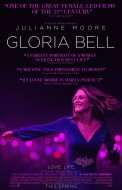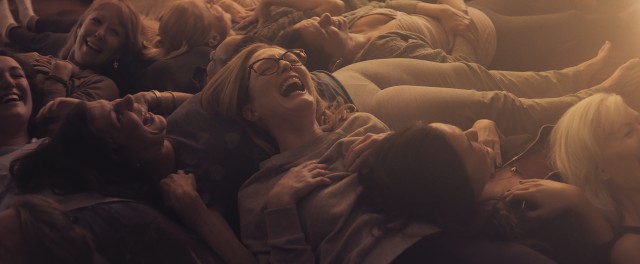Gloria Bell Movie Review
 |
Gloria Bell
Theatrical Release: March 8, 2019 / Running Time: 101 Minutes / Rating: R Director: Sebastián Lelio / Writers: Sebastián Lelio (screenplay), Alice Johnson Boher (adapted screenplay), Gonzalo Maza (story) Cast: Julianne Moore (Gloria), John Turturro (Arnold), Caren Pistorius (Anne), Michael Cera (Peter), Brad Garrett (Dustin), Holland Taylor (Hillary), Jeanne Tripplehorn (Fiona), Rita Wilson (Vicky), Chris Mulkey (Charlie), Cassi Thompson (Virginia), Tyson Ritter (Neighbor), Jesse Erwin (Theo), Sean Astin (Jeremy), Barbara Sukowa (Melinda), Alanna Ubach (Veronica) |
The extremely long filmmaking career of Woody Allen may be in jeopardy, This time around, Julianne Moore plays the titular protagonist, a good-looking divorcée in her fifties who likes to sing along to music in her car and go dancing at nightclubs geared toward her demographic. That might not sound like much of a character or a story, but Moore demonstrates otherwise in one of the better performances in her decades of filling lead roles.
Gloria Bell is a freeform character study. You can categorize it as a romance film because sparks do fly between our heroine and Arnold (John Turturro), a man who has only been divorced one year and is still very much tied to his ex-wife and two grown daughters. But the relationship certainly doesn't define Gloria, who seems confused by Arnold's nervous apology after some time of radio silence following their up until then one-night stand.
Arnold runs a successful paintball park. I don't believe we ever find out what Gloria does for work. We see her in an office and lending a sympathetic ear to a co-worker (Barbara Sukowa) but she is even less defined by her profession than she is by the new man in her life.
Gloria likes to maintain a presence in the lives of her own adult children, her son Peter (Michael Cera), a new father whose young marriage seems to be falling apart under the surface, and yoga professor Anne (Caren Pistorius), who's in something resembling a relationship with a Swedish man who lives in Sweden.
Gloria and Arnold's relationship, marked by a series of starts and stops, takes as much of the spotlight as anything here. It's an honest look at middle-aged romance, unfolding not with big outlandish twists but small moments sweet and sour. We share Gloria's mixed feelings about the relationship, but go along for the ride, with nothing else more pressing narratively than coping with a loud neighbor and an eye doctor visit that yields a prescription for daily eyedrops in perpetuity. It's kind of bizarre that in a medium as productive and diverse as film an earnest portrait of mid-life love seems so unconventional and unusual.
This marks the second English language film in as many years for Lelio, The film is populated by popular songs from decades past that you'll recognize as our heroine floats on the dance floor from one white-haired man to another or simply sings along in her car. The final song is "Gloria", Laura Branigan's 1982 hit cover of a late-'70s Italian tune. The original Umberto Tozzi song was apparently used in Lelio's original Gloria and it's hard to imagine it not being, since the lyrics of the English version (and to a lesser degree, the Italian) seem to have inspired the story and certain specific beats here. Branigan's tune feels like the perfect note on which to end this remake and also this review.
|
Related Reviews:
DVDizzy.com | DVD and Blu-ray Reviews | New and Upcoming DVD & Blu-ray Schedule | Upcoming Cover Art | Search This Site
DVDizzy.com Top Stories:
Now in Theaters: Climax • Captain Marvel • Triple Frontier • Greta • Five Feet Apart
Julianne Moore: Still Alice • The English Teacher • Maggie's Plan • The Kids Are All Right • A Single Man • Chloe • Vanya on 42nd Street • Crazy, Stupid, Love.
John Turturro: Fading Gigolo • Margot at the Wedding • Hands of Stone • The Big Lebowski
Blue Jasmine • You Will Meet a Tall Dark Stranger • Our Brand Is Crisis • Tully
Text copyright 2019 DVDizzy.com. Images copyright 2019 A24, FilmNation Entertainment, Fabula Productions.
Unauthorized reproduction prohibited.

